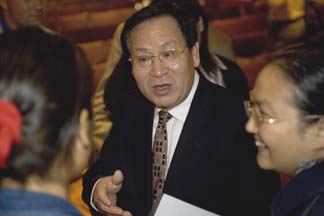Higher education in China is working hard to keep up with demand, says Tsinghua University president
By Lauren Gold

Colleges and universities in China are experiencing unparalleled growth, said Gu Binglin, president of Beijing's Tsinghua University, during a visit to Cornell University Aug. 26. He said Chinese administrators are working hard to cope with the rapid rise in demand for education in a system that has millions of variables and rapid external changes.
Gu, who also is a professor of physics at Tsinghua, was speaking about changes in higher education in China to an overflow audience of students, faculty and administrators in Cornell's Biotechnology Building. Cornell and Tsinghua have been working together for 20 years, and the partnership was renewed and expanded in 2004 by former Cornell President Jeffrey Lehman, who attended the talk.
As China's economy expands and adapts to world markets, Gu said, its colleges and universities are adjusting quickly to keep pace. "Knowledge has become the most important resource for developing countries," he said.
Accordingly, new universities have emerged throughout China (over 150 are run privately, a departure from the Chinese Communist Party model), and established schools have expanded dramatically. In 1949, Gu pointed out, just 107 students earned postgraduate degrees in China. In 2004, the number was 160,000. In 2003, the number of on-campus undergraduate and graduate students in universities across China was 19 million.
Established in 1911, Tsinghua boasts a strong reputation in China. It is the alma mater of the nation's current top three leaders, one-fourth of the members of the Chinese Academy of Sciences and one-fifth of the members of the Chinese Academy of Engineering. Since 1995, Gu said, the university's administrators have been working to increase the distribution of financial aid, encourage students to open their own businesses and to give graduates an edge in the ever-tightening job market. "Each year there are 300,000 college graduates trying to find a job," he said, adding (with a smile), "If they go to Tsinghua University, no problem. But if they go to other universities, it's not sure."
Still, he said, changes are under way to keep the university competitive. In coming years he hopes to expand university partnerships with businesses, increase qualifications for incoming faculty, establish distance-learning opportunities, build a science park and take a bigger role in social services. Toward those ends, he noted, he hopes to learn from the fund-raising strategies of U.S. institutions.
In response to questions from the audience, he added that the university is also working on recruiting women into the sciences (a typical physics class, he admitted, still is overwhelmingly male), on improving the exam-based system for admissions and on incorporating more flexibility into the undergraduate curriculum.
"I am sincerely looking forward to working with our international counterparts, including Cornell University," he said.
In 2004, Lehman and College of Engineering Dean Kent Fuchs signed an agreement to exchange science and engineering faculty and graduate students with Tsinghua. Also last year, G. Peter Lepage, dean of the College of Arts and Sciences, initiated a new undergraduate major in China and Asia-Pacific Studies.
Ji Li, a graduate student in genetics at Cornell and a Tsinghua alumnus, said one of the biggest differences between universities in China and the United States is the freedom allowed to undergraduates. "Cornell undergraduates have more choices," he said, while in China, they find themselves locked into majors and unable to branch out. Li, who wore a Tsinghua University T-shirt to the lecture, said he hopes that will change.
Robert Harris, vice provost for diversity and faculty development at Cornell, said increased attention to China is crucial. "China is a very dynamic, forward-moving country that we need to be involved with. A lot of the future is right there in China," Harris said. "There's a lot we can learn from each other."
Media Contact
Get Cornell news delivered right to your inbox.
Subscribe